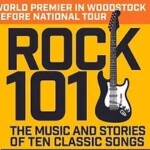Photos by Mary P. Hynes
Saturday was about diversity and power at the 65th annual Newport Jazz Festival. Under glorious but somewhat hot weather and spectacular vistas, Newport couldn’t have been more upbeat. Midway through his closing set, saxophone giant Kamasi Washington, bedecked in a gold dashiki said this about diversity, “It’s not something to be tolerated: it’s something to be celebrated.” Diversity appeared in the form of three female singers on the Fort Stage, young progressive bands, and the traditional as well. Washington, Ghost Note, and Dee Dee Bridgewater delivered plenty of power too. .” Apologies for having missed Buika and Ron Carter’s Trio, among others. One can’t see them all.
The day began at The Quad stage with the vocal group The Royal Bopsters, a vocal quartet backed by a trio. The large crowd were there to hear the legendary 91-year old Sheila Jordan, who in her indefatigable, scatting way, left them satiated. Ralph Peterson & The Messenger Legacy kicked off the Fort Stage as drummer/leader Peterson exhorted the crowd at the outset and conclusion, “Art Blakey, Art Blakey.” All members of the band were alumni of Art Blakey’s Jazz Messengers excepting pianist Zaccai Curtis. They plunged into an exhilarating set of hard bop that featured the horns of Bill Pierce (tenor), Brian Lynch (trumpet) and Robin Eubanks (trombone) with excellent ensemble work and soaring solos from each as well as a tender ballad reading of “My One and Only Love” from Pierce. Bassist Essiet Essiet and Peterson shined on solos as well.
Vibraphonist Joel Ross, only 24 years old, was a virtual MVP and maybe the most popular man at the festival, leading his own quartet on the Harbor Stage and later joining Makaya McCraven’s unit at the Quad. (Ross also showed up on Sunday as you’ll learn in the next report.) Ravi Coltrane played the Quad with innovative Cuban pianist David Virelles as an intimate duo, offering originals and standards. Their performance of Billy Strayhorn’s “Lush Life” with Ravi on soprano (his dad always did the tune on tenor) was exquisite. This segue was the best of the entire festival for this writer, moving from that superb, beautiful duo sound to the excitement of the unparalleled entertainer Dee Dee Bridgewater & The Memphis Soulphony. Bridgewater led the R&B rooted octet with horns and backup vocalists through songs of Al Green, The Staples Singers, Elvis, and B.B. King – all of whom had Memphis in common. The effervescent 69-year-old Bridgewater ran the gamut from lessons on Civil Rights to a a bump-n-grind dancing sequence with her backup singers that was akin to bluesman Bobby Rush’s work with his dancers.
Chicago-based drummer Makaya McCraven led a quintet that melded skittish grooves with a bit of hip-hop, while violinist Jenny Scheinman and drummer Allison Miller’s quartet, Parlour Game, drew an overflowing crowd to the Harbor Stage with their poised, melodic, Americana-influenced set. Grammy winner virtuoso Diane Reeves put her own stamp on Fleetwood Mac’s “Dreams” moving to music of Pat Metheny to surprisingly effective takes on Latin jazz.
One of the surprising moments of the Festival came preceding the overflow crowds that had gathered to hear Herbie Hancock with Christian McBride and Vinnie Colaiuta in a trio. Festival founder George Wein came onstage with Jay Sweet, Brittany Ryan and Christian McBride, the festival’s executive producer, associate producer and artistic director respectively. Wein, a native Bostonian was gifted a thank you note and two personalized jerseys from Boston Red Sox President and CEO Sam Kennedy for his unwavering support of the team. The first read “Newport Jazz” above a number 65 and the second had a 25, representing the year Wein was born.
Hancock told the immense crowd that he hadn’t performed with a trio for a long time. “There isn’t a set list so much as a list of things to think about,” he said. McBride offered nimble plucking support on the opening Wayne Shorter’s (“he’s my best friend) “Footprints” and throughout had high-level musical dialogues with Hancock. Colaiuta, who seems more comfortable in fusion, became more accustomed with his rolls and accents as the set progressed through “in the moment” jazz.
From the sublime to the powerful: first came the super group Ghost Note, anchored by the twin drummers/percussionists from Grammy winners Snarky Puppy. They blended jazz with explosive funk beats and fast-paced hip-hop all played loud to the delight of the dancing, swaying crowd at Quad. With a few core members and other contributors, the group included Dywane “MonoNeon” (written all over his attire and bass guitar)Thomas Jr., known for his work with Prince, and Toto’s keyboardist Xavier Taplin. The first two songs brought standing ovations as the rhythms laid down by drummers Robert Sput Searwright and percussionist Nate Werth were rousingly infectious. Kamasi Washington and his seven piece unit were joined by his father, Ricky, who played flute and soprano. Washington has brought legions of young fans, seen crowding the Fort Stage, to jazz since the release of his 2015 album, The Epic. As per usual, their set built from “Truth “ (5 different melodies at same time to represent diversity) to its dramatic conclusion with Kamasi’s Coltrane-like soloing and vocalist/dancer Patrice Quinn’s stirring performance on “Fists of Fury.”
—Jim Hynes







Be the first to comment!